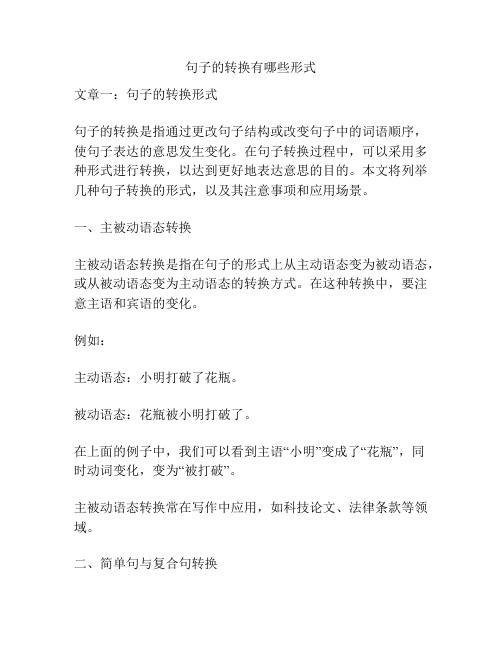复合句改为简单句
(完整版)牛津英语9BU4LifeonMars

牛津英语9BUnit4 Life on Mars【重点词汇】1、look for,find,find out这三个词都有“找”的涵义,但具体用法有别:1)look for意为“寻找”,是有目的地找,强调“寻找"这一动作。
如:-What are you looking for?—I'm looking for my bike.2)find意为“找到”“发现”,强调“找”的结果,其宾语往往是某个丢失的东西或人。
如:-Did you find Li Ming yesterday?-No,we looked for him everywhere,but didn't find him.3)find out着重表示通过理解、分析、思考、询问等“弄清楚”“查明"一件事情,其后的宾语常常是某个情况、事实。
如:Please find out when the train leaves.Have you found out why he was late?2、take 拿,取take sth with sb 把某物带在身边take sth/sb to sp 把某人/某物带到某地E。
g You should take an umbrella with you.Can you take my bag to the classroom please?【拓展】take的用法1)表示“乘坐某一交通工具”Shall we go there by bike or take a taxi?They usually take a bus to work。
2)表示“花费”,常常和it连用,it在句子中作形式主语,真正的主语是后面的不定式.How long will it take you to do your homework every day?3)吃,喝,服用,放Will you take a glass of milk?Take the medicine three times a day。
从句与非谓语动词之间的转换

从句与非谓语动词之间的转换非谓语动词和从句可以相互转换,那么如何将复合句改为简单句呢?首先,需要分清主从复合句,然后取消从句,一般要把引导从句的连词去掉。
例如,将"When he was waiting for the bus。
he saw a dog"改为"Waiting for the bus。
he saw a dog"。
其次,如果从句的谓语动词是主动式,就要把谓语动词改为现在分词;如果从句的谓语动词是被动式,就要把谓语动词改为过去分词,并且要注意时态的变化。
例如,将"After he had finished his homework。
he went home"改为"Having finished his homework。
he went home"。
另外,使用分词短语作状语时,它逻辑上的主语必须与句子的主语一致。
如果主从句的主语不一致,在取消掉从句变为-ing或-ed形式时,要把从句的主语保留,其它部分和以前的改法一样。
例如,将"As it was hot。
we went swimming"改为"It being hot。
we went swimming"。
需要注意的是,在使用分词短语作状语时,它也可以有自己独立的逻辑上的主语,这种结构称为独立主格结构。
在很多情况下,它都表示一种伴随的动作或表示一种原因。
例如:1.If the weather allows。
I will go there.2.After the rain ped。
XXX.3.His XXX。
and he prepared to return to his institute.4.With so many comrades absent。
XXX.From the above examples。
we can see that the present participle (-ing) usually indicates an n that is happening at the same time as the main verb in the sentence。
复合句与简单句的转换技巧

复合句与简单句的转换技巧Revised as of 23 November 2020复合句与简单句的转换技巧?一、含宾语的复合句转换为简单句即将宾语转换成相应的短语。
如:We expected that you would come. 我们希望你来。
→We expected you to come. 我们希望你来。
Now tell me what I should do. 现在告诉我该怎么办。
→Now tell me what to do. 现在告诉我该怎么办。
I remember I once met her at a party. 我记得在一次晚会上见过他。
→I remember once meeting her at a party. 我记得在一次晚会上见过他。
I ask him what I shall do. 我问他该怎么办。
→I ask him what to do. 我问他该怎么办。
I can’t decide whom I should invit e. 我不能决定该邀请谁。
→I can’t decide whom to invite. 我不能决定该邀请谁。
二、含状语的复合句转换成简单句即将状语转换成状语短语。
如:He can’t come because he is ill. 他因病不能来。
→He can’t come because of his illness. 他因病不能来。
Turn off the light before you leave. 离开前请关灯。
→Turn off the light before leaving. 离开前请关灯。
He went home after he finished his work. 他做完工作后就回家了。
→He went home after finishing his work. 他做完工作后就回家了。
He was so angry that he couldn’t speak. 他气得话都说不出来。
复合句与简单句的转换技巧

复合句与简单句的转换技巧————————————————————————————————作者:————————————————————————————————日期:复合句与简单句的转换技巧一、含宾语从句的复合句转换为简单句即将宾语从句转换成相应的短语。
如:We expected thatyou would come.我们希望你来。
→Weexpected you to come. 我们希望你来。
Now tellme what Ishould do. 现在告诉我该怎么办。
→Now tell me what todo.现在告诉我该怎么办。
I remember I once met her ata party.我记得在一次晚会上见过他。
→Iremember once meetingher ataparty. 我记得在一次晚会上见过他。
I ask himwhat I shall do. 我问他该怎么办。
→I ask him whatto do.我问他该怎么办。
I can’tdecide whom I should invite.我不能决定该邀请谁。
→Ican’t decide whomtoinvite.我不能决定该邀请谁。
二、含状语从句的复合句转换成简单句即将状语从句转换成状语短语。
如:He can’tcome becauseheis ill. 他因病不能来。
→He can’tcome because of hisillness. 他因病不能来。
Turn off the light before you leave.离开前请关灯。
→Turn off thelightbefore leaving. 离开前请关灯。
He went home afterhefinished his work.他做完工作后就回家了。
→Hewenthomeafter finishing his work. 他做完工作后就回家了。
He wasso angry thathecouldn’t speak.他气得话都说不出来。
初中英语同义句转换的九种类型

初中英语同义句转换的九种类型同义句转换题是近几年中考及初中三年期间英语的一个常考题型,其出题形式通常是同时给出两个句子,第一句完整,第二句中设有几处空格,要求填入适当的词或词组,使第二句的意思与第一句意思相同。
它综合考查学生的语法、词汇、短语或习惯用语和句型结构等知识,要求运用所学的词汇、语法知识和句型结构填写句子,使句子结构完整、逻辑合理、语法知识无误、意思与所给句子相同。
通过对近几年的中考英语试题中同义句转换题的分析,我们发现中考英语同义句转换题主要考查以下几个方面:运用同义词(组)进行转换用同义词或同义词组对原句中的某些词或词组进行替换,注意转换后的词或词组的词形变化要与句子其他成分相适应。
如:1. That day we could see flowers here and there.That day we could see flowers __________.答案:everywhere解析:everywhere与here and there都表示“到处”。
2. The teacher always takes good care of the children in the school.The teacher always______ _____the children well in the school.答案:looks after解析:take good care of与look after…well都表示“好好照顾”。
运用反义词(组)的否定式进行转换即用反义词或词组的否定式表达与原句相同的意思,主要考查学生对反义词(词组)的积累和换位思维的能力。
如:1. It’s clear that this visit is different from last time.It’s clear that this visit is not the___ ___last time.答案:same as解析:be different from意为“与……不同”;the same as 意为“与……相同”,其否定式与be different from同义。
不定式与复合句之间的转换

不定式与复合句之间的转换--中考之总结+练习题一、动词不定式是一个仅仅含有动词原形和附加成分(宾语、表语)以及连带成分(状语)的短语,转换为从句时主要围绕动词做文章。
既然不定式变成谓语动词,以下几点必需要考虑: 1. 在原句中找出不定式的逻辑主语,使其成为转换成句子后的主语; 2. 确定不定式所表达的时态或情态,把转换后的谓语动词变成相应的时态(将来、一般、完成或进行),有时候还有必要另加情态动词can/could, may/might; 3. 确定原不定式在句子中所充当的成分(主语、宾语、表语、定语或状语),然后加上必要的关连词改为相应的从句。
二、与转换有关的不定式的相关知识 A. 不定式的逻辑主语有下列几种情况 1. 句子的主语就是不定式的逻辑主语,如: He helped to build a reservoir. You must come to see me on Sunday. What have I done to make you so angry? 2. 不定式的逻辑主语是相邻的名词 It's kind of you to see me. We know her to be a brave girl. Did you see him enter the room? It is for you todecide. 3. 不定式的逻辑主语存在于不言自明的语境中 To talk with him is a great pleasure. (可能是we, you 或everybody) Our plan is to finish the work in two weeks. (we) It is wrong not to help others. (we, they 或you) B. 不定式的时态 1.不定式的一般式的行为常表示下列两种时间: * 如果作宾补,与谓语动词同时发生,如: I saw him go out. Would you help me to put things in order? * 其他情况多数发生在谓语动词后,如: I hope to see you again. He wanted to be anactor. 2. 不定式的完成式的行为发生在谓语动词之前,如: I am sorry to have kept you waiting. 3. 不定式的进行式的行为发与谓语动词同时发生,如: He seems to be recovering. C. 不定式的词性以及在句子中充当的成分 1. 名词性主语: It is our duty to help you. 宾语: She decided to try again. 表语: Her job is to take care of the children. 2. 形容词性定语:He is always the first one to get up. 3. 副词性目的状语:He came here to see me yesterday. 结果状语:He is too excited to go to sleep. 形容词补足语:I am sorry to hear that.三、转换实例 1. 不定式——名词从句 To talk with him is a great pleasure. ( 主语) --It is a great pleasure (that we can) talk withhim. He hopes to be a sailor.(宾语) -- He hopes (that he can) be asailor. My suggestion is to wait a little longger.(表语) -- My suggestion is (that we should) wait a little longger. The plan to finish the work in two weeks has been handed in. (同位语) -- The plan (that we/they should) finish the work in two weeks has beenhanded in. 2. 不定式——定语从句 He is the only one to go to the party in our class. -- He is the only one (who will/may) go to the party in our class. 3. 不定式——状语从句 We all work hard in order to complete our assignment in time. (目的) -- We all work hard in order (that we can) complete our assignment in time. We hurried so as to be in time for the meeting. (目的) -- We hurried so as (that we might) be in time for the meeting. He is too young to join the army (结果) -- He is too young (that he could not) join the army. His behaviour was such as for us all to refuse to receive him in our homes. (结果) -- His behaviour was such (that we all refused) to receive him in ourhomes. I'm very sorry to have kept you waiting. (原因) -- I'm very sorry (because/as/for I) have kept you waiting. 四、不定式的转换有时候不能死板硬套上面的格式,有些特殊情况还需要特殊对待。
句子的转换有哪些形式

句子的转换有哪些形式文章一:句子的转换形式句子的转换是指通过更改句子结构或改变句子中的词语顺序,使句子表达的意思发生变化。
在句子转换过程中,可以采用多种形式进行转换,以达到更好地表达意思的目的。
本文将列举几种句子转换的形式,以及其注意事项和应用场景。
一、主被动语态转换主被动语态转换是指在句子的形式上从主动语态变为被动语态,或从被动语态变为主动语态的转换方式。
在这种转换中,要注意主语和宾语的变化。
例如:主动语态:小明打破了花瓶。
被动语态:花瓶被小明打破了。
在上面的例子中,我们可以看到主语“小明”变成了“花瓶”,同时动词变化,变为“被打破”。
主被动语态转换常在写作中应用,如科技论文、法律条款等领域。
二、简单句与复合句转换对于句子结构的转换,可以将简单句转换为复合句,反之亦然。
这种转换方式可以更准确地表达意思,增加语言表达的功能。
例如:简单句:小明在学习。
复合句:小明正在学习,因为他想要考取高分。
在上面的例子中,简单句转换成复合句,增加了原有语句的信息量和丰富性。
三、同义词转换同义词转换是指将有相同或相近含义单词进行替换,以增强句子表达的准确性和美感。
例如:原句:她的头发是金黄色的。
同义词转换:她的头发是黄金色的。
在上面的例子中,将金黄色替换为黄金色,不仅增强了语言的美感,还使句子表达更准确。
总之,句子转换是一种有效的表达方式,可以让我们更好地传递信息和意义。
在实际应用过程中,我们可以选择适合自己的转换方法,使语言表达更为精准和熟练。
文章二:句子的转换形式句子转换是指通过变换语言形式,更好地表达我们的意思。
在句子转换过程中,会选择不同的转换形式,以达到更好的表达效果。
本文将简要介绍几种句子转换形式,以及其应用场景和注意事项。
一、反问句转换反问句转换是指将陈述句转变成一种疑问的形式,以表现自己的态度或感情。
在这种情况下,原句的意思不会改变,但对听者的语气会有一定的影响。
例如:原句:他不可能会做这种事情。
含有宾语从句的复合句转化 为简单句

含有宾语从句的复合句转化为简单句1. that引导的宾语从句,且从句主语与主句的主语相同时,宾语从句有时可简化为不定式。
如从句的主语与主句的主语不相同时,宾语从句有时可简化为名词/代词宾格+不定式。
I hope that I will go to college one day.I hope to go to college one day. 我希望有一天能上大学。
They agreed that she would help me with my math.They agreed her to help me with my math. 他们同意帮助她我数学。
2. that引导的宾语从句,且从句主语与主句的主语相同时,宾语从句有时转化为动名词短语。
I forget that I have turned off the light.I forget turning off the light. 我忘了关灯。
I remember that I have told him the story.I remember telling him the story. 我记得给他讲了这个故事。
2.由疑问代词what或疑问副词how, where, when, why等引导的宾语从句,主句的主语与从句的主语一致时,宾语从句有时可转化为“疑问词+不定式”结构。
Kate did’t know what she should do.Kate did’t know what to do. 凯特不知道该做什么。
I have forgotten how I can use this word.I have forgotten how to use this word. 我忘了怎么样用这个词。
3. 当主句的谓语动词后接双宾语,从句是特殊疑问句,且主语和间接宾语一致时,宾语从句有时可转化为“疑问词+不定式”。
Could you tell me how I can get to the park?Could you tell me how to get to the park?Please tell me where I can find him.Please tell me where to find him. 请告诉我在哪里能找到他。
- 1、下载文档前请自行甄别文档内容的完整性,平台不提供额外的编辑、内容补充、找答案等附加服务。
- 2、"仅部分预览"的文档,不可在线预览部分如存在完整性等问题,可反馈申请退款(可完整预览的文档不适用该条件!)。
- 3、如文档侵犯您的权益,请联系客服反馈,我们会尽快为您处理(人工客服工作时间:9:00-18:30)。
三、将定语从句变为简单句 (提高部分)
1)当定语从句是主动语态并且用的是进行时态时, 可将定语从句改为现在分词短语;当定语从句中 的谓语动词是表示经常性的动作时,可将定语从 句改为现在分词短语。如: The man who is talking with Mary is my brother. talking with →The man _____ _____Mary is my brother. A chemist’s shop is a shop which sells medicine. medicine →A chemist’s shop is a shop selling _____ _____.
2) 含有so …that …引导的结果状语从句(肯定)的复合句 用“…enough +不定式”结构可以将变为简单句。例如: 1. The girl is so tall that she can reach the apples on the tree. tall enough to reach →The girl is _____ _____ _____ _____the apples on the tree. 2.This hall is so large that it can hold 2000 people. to _____ hold 2000 people. →This hall is large enough _____ _____ 3. The table was so light that the little boy can carry it. light _____ enough for the little boy _____ →The table was _____ _____ to carry.
二、将状语从句变为简单句
1) 含有so…that引导的结果状语从句(否定)的复合 句用“too…to…”结构可以转成简单句。如: 1. The boy is so young that he can’t look after himself. too young to →The boy is _____ _____ _____look after himself. 2. The question is so difficult that I can’t answer it . too difficult for me_____ to →The question is _____ _____ _____ answer. 注意:第2句的主从句主语不一致, 用for +sb.(宾格)连接
4)用名词或名词短语改写。如: Do you understand what I said? my words → Do you understand _____ _____ ? Can you tell me what he means? his meaning → Can you tell me _____ _____ ?
8)把时间状语从句转化为一个介词短语。如: I could swim when I was eight years old. →I could swim _____ _____ _____ the age _____eight. at of He went home after he finished his work. →He went home _____ _____ his work.
复合句改为简单句
一、将宾语从句变为简单句
1)用“及物动词+不定式”结构可以将含有that引导 的某些宾语从句的复合句转换成简单句。例如: 1. He decided that he would buy a digital camera online. to buy →He decided_____ _____ a digital camera online. 2. We hoped that we would come back soon. to come →We hoped _____ _____ back soon. 3. I expect that I shall finish my work by this Sunday. to finish →I expect _____ _____my work by this Sunday.
after finishing
另外:时间状语从句之间可以相互转化 when/before/after → not…until John will go to bed after he finishes his homework. won’t ______ go until he → John ______ to bed ______ finishes his homework. He stopped playing the game when his father came back. didn’t _____playing stop He _____ the game _____ until his father came back.
5)if条件状语从句可为转换“祈使句,and/or+简单 句.”。肯定可转换为"祈使句+and+简单句"。否 定可转换为"祈使句+or+简单句";如: If you use your head, you’ll find a way. Use and you’ll find a way. →_____your head, _____ If you aren't brave, you'll lose your chance. Be brave or you'll lose your → _____ _____Be brav些含有状语从句的复合句用作表语的形 容词+不定式可以转变成简单句。例如: 1. I was glad when I heard the good news . glad _____ to hear →I was _____ _____the good news. 2. Tom’s parents were very surprised as they knew all about it. very surprised →Tom’s parents were _____ _____ _____ to know all about it.
2)当定语从句是被动语态时,可将定语从句改为过 去分词短语;当定语从句是表示将要发生的动作 或具体某种情态意义时,可将定语从句变为不定 式短语。如: This is a book which was written by a worker. →This is a book _____ _____ written by a worker. There is a lot of homework that we should do. for us _____ to →There is a lot of homework _____ do . _____
2)用“疑问词+不定式“结构可以将某些含有连接代 词或连接副词引导的宾语从句转换简单句。例如: 1.I don’t know which one I can buy . one _____ to _____. buy →I don’t know which _____ _____ 2.We wonder where we’ll go this Sunday. to _____ go this Sunday. →We wonder where _____ _____ 3.Could you please teach me how I can search the Internet? how _____ to →Could you please teach me _____ _____ the Internet? search
3)用复合宾语,即"主语+谓语+宾语+宾补"这 种结构语改写。如: I saw he went into that house just now . go into him _____ → I saw _____ _____ that house just now. I heard she was singing in English. her singing → I heard _____ _____ in English.
宾语从句
疑问词+ to do
1. He hasn’t decided which seat he should take. which seat to take He hasn’t decided__________________________.
2. I really don’t know where I can find my lost key.
6)because引导的原因状语从句与because of的转 换。如: He was late for school because it rained heavily. because of heavy →He was late for school _____ _____the _____ rain. 7)if not引导的条件状语从句转化为without短语。 如: I can’t pass the exam if you don’t help me. help →I can’t pass the exam without _____ your _____.
注意:第3句的主从句主语不一致, 用for +sb.(宾格)连接
3) 含有so that 引导的目的状语从句的复合句用“in order +不 定式”或“so as +不定式”结构可以转换为简单句。如: 1. She decided to buy a camera online so that she could receive it soon. in _____ order _____ to →She decided to buy a camera online _____ receive it soon. so as to 2. I went over my composition again and again so that I couldn’t make any mistakes. in →I went over my composition again and again _____ order_____ not _____ to _____ make any mistakes. so as not to 3.Marybought a camera so that she could take pictures in Beijing. in _____ order _____ to →Mary bought a camera _____ take pictures in Beijing. so as to
